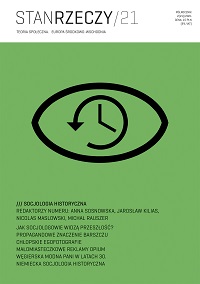
No. 2(21)Historical Sociology

Issue description
Historical sociology is interested in processes rather than events, in structures over characters, in path dependence more than historical turns. As a research stream, historical sociology is distinguished by its subject and nature: on the one hand, it is a sociological analysis of past phenomena, and on the other, it is a study of social processes that began in the past but whose consequences are an important contemporary phenomenon. The first type of research activity is called historical microsociology; the second is historical macrosociology. The first searches for an explanation of specific historical phenomena, for instance, the role of borscht in the cultural diplomacy of the Second Polish Republic, the importance of photography for peasant identity at the turn of the century, or the model of femininity in interwar Hungary. It proposes a scheme of interpretation and applies it to historical data, which are often, though not necessarily, source materials. This kind of activity is akin to social history. The second type of activity tries to answer the questions of where the phenomenon came from and what historical circumstances contributed to its formation. Such questions include the genesis of the great phenomena of modernity, such as capitalism and the nation-state, and the shaping of smaller scale phenomena, such as educational or class systems.
Thinking about history is reflected in the public debate about the elite and the people, social classes, and economic and cultural domination. In the last few years, references to history have become more frequent in Polish sociological research. In a manner characteristic of periods of anxiety, and of transformations in world hierarchies of power and ways of life, we look to history for tools with which to understand the present.